This experience is multisensory. If you’re on mobile or don’t have sound turned on, hit PLAY on the first embed and grab some headphones.
The air was dark above Gravesend, and farther back still seemed condensed into a mournful gloom, brooding motionless over the biggest, and the greatest, town on earth.*
In the deep night, I thump my chest with a fist, take a few huge breaths, in, and out.
The worst thing, I have found, is to just lie in bed, eyes wide on the darkness of the ceiling. Better distract the mind, get a cup of cowboy coffee and just head into work before the first hint dawn. Or, gaze into a glowing laptop screen and lose yourself in an exploration of all the wonders of the web of the internet.

My jumping off point is usually a topic from a recent conversation I want to research, say “hydroponics” or “composition and framing” or “university accreditation.”
This particular night, I had a conversation with my friend Grant fresh on my mind. He’s got a Davinci-like breadth of interests, from battery tech to cinematography. I had asked him where he goes exploring on the web.
I was a little surprised when he mentioned social feeds, because in my experience they were becoming saturated with the same old ideas, just like Craigslist has become saturated with apartment hunters, everyone with access to the same information. The way to get the real intel—and the only way to find a deal—is to go direct, hit the streets.
But I have an immense respect for Grant, and thinking maybe I am missing something, I go to investigate who he follows.
Scrolling through, words like “artist,” “strategist,” “developer,” “producer” catch my eyes. It strikes me that these labels are more often conversation enders than conversation starters, attempts to reduce a vast complexity into a neat, little word, with the lossiest of compression algorithms—perhaps so that one might only be troubled to put forth a binary effort in his response, “like” or “dislike.” We cheer for the clothes. Feynman comes to mind:
The prize is the pleasure of finding the thing out, the kick in the discovery, the observation that other people use it. Those are the real things. The honors are unreal to me. I don’t believe in honors. It bothers me, honors. Honors is epaulets, honors is uniforms.
I begin to wonder what some other wanderer of the internet on a night like this one might encounter if they stumbled across my name via some connection and tried to find out more “about me.”
This article has multiple issues.
I google my name, and this site—where I have tried to capture thoughts and ideas in a style that should give you a sense of who I am and what it might be like to have a conversation with me or work with me—this site is not even above the fold. Instead, (1) a Business Insider article, consisting solely of copy/pasted snippets from an essay I had written here. (2) An empty Twitter profile, still somehow ranking. (3) A CrunchBase page. (4) A Wikipedia page? That is new.
Curious what strangers would now find as the canonical and authoritative source on my identity, I visit the Wikipedia page.
At the top, I see an exclamation point, circled in orange warning, next to the following text:
This article has multiple issues. Please help improve it or discuss these issues on the talk page.
- A major contributor to this article appears to have a close connection with its subject. (August 2014)
- This article is an autobiography or has been extensively edited by the subject or an institution related to the subject. (August 2014)
- This article may require copy editing for grammar, tense, encyclopedic style. (August 2014)
- The topic of this article may not meet Wikipedia’s general notability guideline. (October 2014)
In agreement with the note about notability but worried about the false accusation about autobiographical authorship, I begin digging through the revision history. The first edit of the page was in Jul 2014. I consult my journal entries from July to see what was going on in my life at that time.
Journaling and the Medium
I have not always kept a journal.
Sometime in early 2014, I had this thought: once you have a garage, you will fill it. I felt the sheer volume of things I had published had grown so large that it was now too easy to post “just one more thing”—often mediocre—adding to the clutter.
I began a spring cleaning frenzy, in the small hours of the night, naturally.
I read through everything I had published and started pruning. It felt like I was having a conversation with a different person, and it was enlightening to see where the present self had fulfilled past ambitions, where it had similar thoughts, where it had diverged.
I wanted to be able to have this sort of retro again in another five years, but at the same time I did not want to simply amass more clutter by resuming the habit of publishing every thought I had.
So I had this idea to start keeping a journal. I would have the advantage of recording my observations, giving ideas more rigorous treatment and depth than I might if I considered them only in cursory thought or conversation, but without the danger of diluting my public corpus.
After a few months of keeping a journal, I was suprised to find that I had begun writing about things that I never would have blogged about, because I knew they were only interesting to me. The medium began to define the message.
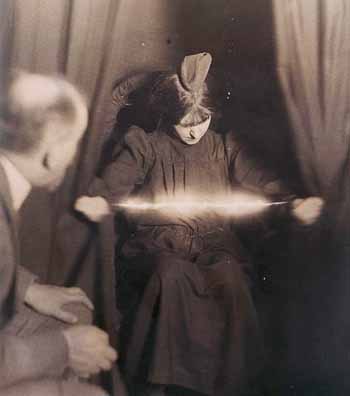
Beyond helping me practice a more thoughtful observation of my own mind and experiences, journaling has inspired me to reexamine the suitability of various modes of expression for various ideas.
The essay has always been the most natural tool for me to express an idea or articulate an argument. Its form is simple, its tone conversational. And, as an author, the essay is a way to augment the thinking. By collecting ideas on a page, in a draft, I’m able to make better sense of them, understand relationships, dependencies, and logical connections that might be too complicated or too numerous to hold in my own working memory.
Another tool I’ve historically been fond of as a means of expression is software. It bears a lot in common with writing, in terms of authorship, but it’s experienced a bit differently. Instead of asking someone to consider an idea or imagine if the world were a certain way, you can simply construct an experience and bring it into existence for someone to enjoy, IRL.
As I have become a better student of my own mind, I have begun observing ideas that require new tools of expression. One example: I had this dilemma that I could not sort out, with two strong voices in my head representing different ends of a spectrum, two sides of an argument, and found that I just wanted to present the sides without taking a stance myself for one side or for the other (or even the no-side stance). I just wanted to present the things. So, in the spirit of Plato and using dialectic as a tool for finding the truth, I started writing this idea I had as a bit of dialogue, and it worked. I gave the characters names, and realized there were other themes throughout a bunch of my journal writing and thoughts that might fit well with each character. A story began to form. And so now, I’m writing some fiction, a screenplay, not because I sat down and decided one day, I want to write a screenplay, but because that was how the ideas in my head needed to be expressed.
“Hummmmmm, the plot thickens.”
Examining some of my journal entries from July, I notice an odd coincidence—rather, two odd coincidences—that occurred shortly before the appearance of the Wikipedia page.
(1) I had begun a draft of an essay, more of a manifesto, really, gathering a bunch of thoughts on nutrition and healthcare, diseases of civilization, the collusion between “big food” and the government…. And I was sharing around this draft for early feedback with some close friends, mentioning some of the ideas contained therein when out at dinner, etc.
(2) THIS entry:
2014-07-15
Discussed developing a reboot/prequel of The Detective Ruxpin Capers with Dennis [who co-authored the original with me] over lunch at Jazzy’s today. Very promising. Plan to change the tone from whimsical to much darker humor. Note to self: don’t get greedy, keep to 10-20 episodes, even if there’s demand/money for more (cf, Chouinard).
Funny thing happened on the way home. We took the long way, because I wanted to show Dennis this beautiful, interesting door marked Holland Tunnel on Spring St—looks like it’s for horses or something, very strange. We noticed these three guys following us, two with black suits, dark sunglasses, one with burly arms, flannel, and Wranglers—much too brawny to be a hipster. As we walked back along Spring, they crossed the street, a black Sububurn rolled up, Homeland style, and they all hopped in together and sped off.
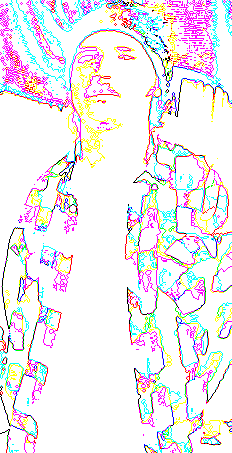
Dennis: (on Facetime) A to the mutha fuckin’ K. (smiles a hello old friend it’s really good to see you once again smile) What’s up?
Me: Hey, you remember this summer after lunch at Jazzy’s, we saw that flannel shirt and the black suits we thought might be tailing us hop into a black SUV?
Dennis: (laughing) Yea, man. Hilarious.
Me: I’m getting a little paranoid. (I fill him in on the story thus far … pop? … sans soundtrack and some of the tangents.)
Dennis: Who did you send the manifesto to? How did you send it to them? Did you use encryption?
Me: (Like a child looking at the ground, hands in pockets, shoulders scrunched, digging ball of one foot into floor back and forth into the floor.) Noooo…
Dennis: Shit, man, I told you to always use cryptocat.

Me: It’s just not as convenient as email or text. I mean, it’s hard enough to get someone to read a draft and give constructive feedback when there’s no crypto hurdles.
Dennis: We’re drifting. What’s the hypothesis?
Me: USDA “hush up.”
Dennis: Motive?
Me: Money. Misinformation. This message is dangerous to their operation. They can’t let it get broadly disseminated.
Dennis: But they can’t prevent you from publishing it, so…. they’re obfuscundating you.
Me: Did you just make that up?
Dennis: Nah, I’ve been thinking about this idea for awhile—literally hiding you in a flood. Er, figuratively. You know what I mean…. Anyway, the point is that the choke point used to be at time of publication, mass media used to be more one-to-many, pre-internet. Control the printing press, the radio waves, the TV channels, and you could control the information broadcast to the masses, and hence, you control the masses.
.. With the internet, all the consumption devices are also publishing devices, so you lose that control point. So, the forces that be had to devise new means to suppress information they don’t want getting to the people. So, like, now, anyone is free to publish, and they can’t prevent that.
.. But what they can do is drown you out, with gossip, and sensation, BuzzFeed, baby and cat photos, tweet storms….
.. And so they try to ensure the systems that proliferate are the ones that by design incentivize everyone to share and reshare and reblog all these easy dopamine hit types of content.
.. The like button, the reblog button, the retweet, man, the ultimate tools to enable people to trick themselves into believing they are contributing to public discourse when in fact it just floods these streams even more without requiring anyone to actually do any thinking. It’s straight from the federal government, I swear, you know what I mean? Panem et circenses, man.
.. The popular culture is fetishizing “participation,” but it’s only empty participation that the establishment is willing to encourage. And, they are demonizing listening. If they condition everyone to be yelling all the time, no one will be able to hear the revolutionaries.
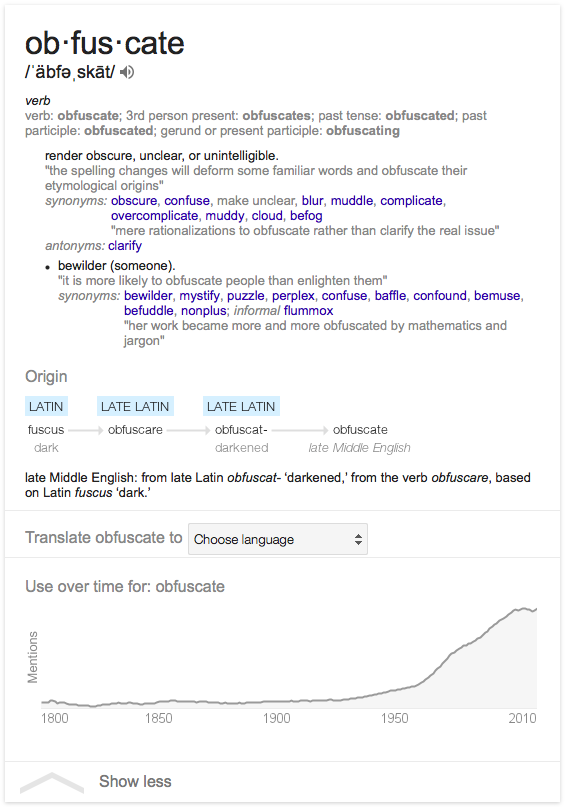
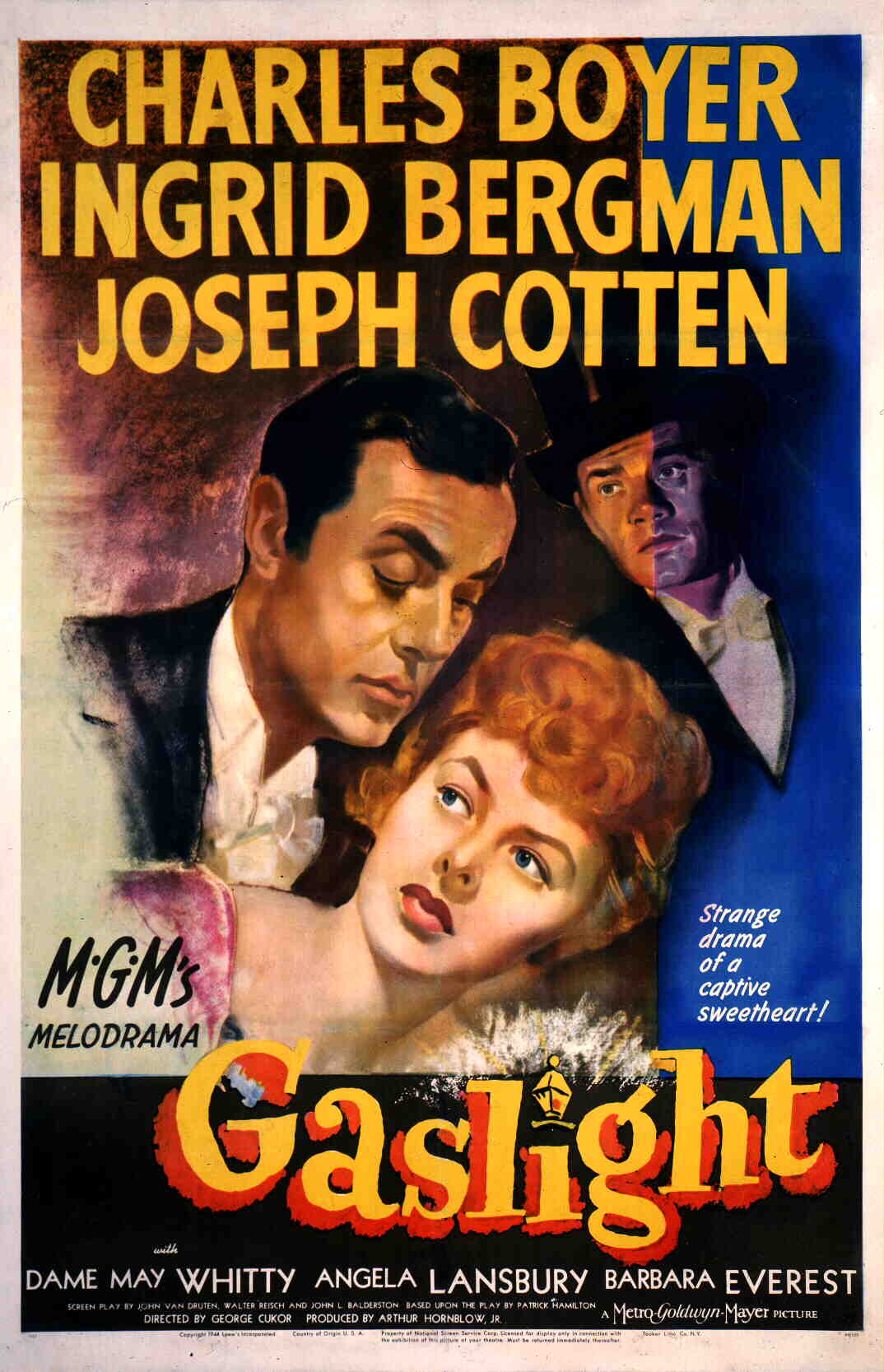
Bring Your Own Bread, Welcome to the Circus
I do indeed know what he means. I had this buddy Alonso Quixano, who was something of an idealist, and an amazing chef. He steadfastly maintained that if you build it, they will come, and refused spend any time distracted from his craft on anything that resembled marketing. In fact, he got swept up in a sort of anti-marketing experiment with his latest project, Avocadabra, an avocado toast specialty shop. They had avocado toast of all kinds. Their flagship offering, for example, featured a simple spread made of avocado, fresh lemon juice, expeller pressed olive oil, sea salt, and red pepper flakes, served on a toasted slice of Cranberry, Raisin & Pecan Bread, procured fresh from the Boulangerie at Balthazar each morning.
Avocadabra had no online presence, on Facebook, Instagram, etc. I think they even paid Yelp to delete pages and reviews if anyone tried to create them on their behalf. They operated out of a food truck which would park at a random location in Red Hook each morning at a different hour. The only way to find the place was biking up and down the streets, looking for the signature green flag waving atop the truck. There was about a fifty percent chance of actually finding them if you went looking. But damn, the avocado toast was good.
As you might imagine, things got tough, financially, pretty quickly, and concerned patrons started trying to help out by posting glowing reviews to their social networks, but these were quickly lost in the flood, and today Avocadabra exists only in a few loving memories.
This Wikipedia page, Dennis and I reason (having switched from Facetime to cryptocat), was an escalation of obfuscundation. Already having secured an information containment via content flood of social channels, the USDA (likely, in cahoots with the Corn Farmers Coalition or perhaps Coca-Cola) next attempted to lockdown the waning but still important search channel. Their strategy was complicated and three-pronged. (1) Control the best possible search result page for threat, namely, the Wikipedia page for the author, me. (2) Call into question author’s credibility on the subject at hand by limiting his domain expertise to other fields. (3) Further discredit author by suggesting he created his own Wikipedia page.
Dennis: We need to go back to the scene of the crime (meaning the Wikipedia page) to look for clues. Cryptocat only from here on out.
Creation of the Wikipedia page is attributed to one, Tadwook, which upon a little research proves to be the nom d’Internet of an old friend I used to live with in a warehouse out on Meserole St in Brooklyn.
Me: They really did their homework. Look, they set things up so that “A major contributor to this article appears to have a close connection with its subject.”
Dennis: ‘natch. Hmmmmm… I think this is gonna get deep. We should really bring this to Baz Bagelenseed, a PI I met via a Craigslist gig a few years back. Let’s have a look and see if he has ideas on how to trace this. Can you meet me in deep Chinatown tonight at nine? I’ll drop a pin and message you. I don’t know the address of the place, just how to find it on foot.
Down the Rabbithole
Baz: They’re already at the 6th stage of the lie (spinning away from a multiscreen display he was hunched over in some sort of para-military, spec ops looking cargo pants and a Flying Burrito Bros t-shirt with some of the lyrics to My Uncle on the back)
Dennis: What’s the 6th stage of the lie?
Baz: The lie circumstantial.
Me: What are the other five?
Baz: There are actually six other stages, seven total: the retort courteous, the quip modest, the reply churlish, the reproof valiant, the countercheck quarrelsome, the lie circumstantial—that’s what we have here—and then finally the lie direct.
Dennis: How do you know all that?
Baz: Deep Shakespeare, semester in London in spring of ‘04. Anyway, it’s a good thing we caught them before the final stage—there may still be time. Let’s go down the rabbit hole.
Baz starts pulling IP addresses from the Wikipedia page revision history and geolocating them. Zurich. Denver. Wichita.
Baz: Bingo. (full beat) Have you heard of KSCORN?
We shake our heads, no.
Headquartered in Garnett, KS, about two hours east of Wichita, Kansas Corn is an agro outfit on a “mission of education and advocacy.” Baz had encountered them a few years ago in an private investigation on behalf of the daughter of Satoshi Tanaka, a mythic Super Famicom developer that no one had ever met in person. He was known by name only, for game patches and mods he distributed via postal mail on chips you had to solder into the game cartridges. He disappeared from the scene in 1995, much to the disappointment of the indie-game community.
At the time of his disappearance, he was rumored to have been working on a mod of Secret of Mana. It was the most ambitious project he had ever attempted. The mod supposedly replaced the entire item and magic systems with a highly realistic nutritional system based on the concepts in Paul Pitchford’s now seminal Healing with Whole Foods. The goal was to present the educational nutritional information of Pitchford’s book in a format children would find highly engaging and interactive. Tanaka chose Secret of Mana because of the game’s immense popularity and beautifully rendered natural landscapes.
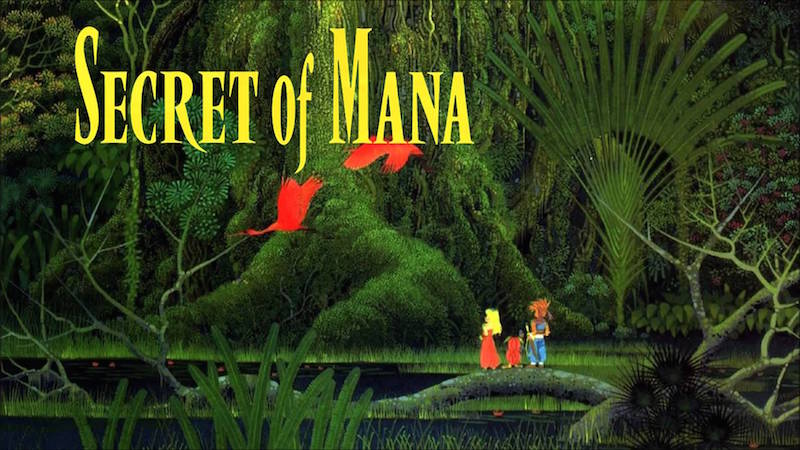
One of the principle clues had been a bunch of envelopes, anonymously sent in a Fedex box to Tanaka’s daughter. The envelopes had been addressed to Tanaka from agricultural aristocrats known to have family connections to some of the current KSCORN leadership. The case went unsolved, but Baz and the Tanaka family still maintain that Tanaka’s disappearance was a result of big corn not being amenable to the distribution of the radical nutritional ideas presented in the game mod.
Dennis: These guys do not fuck around.
We spend the next several hours dissecting the content of the Wikipedia article. The only other clue we uncover is in the final line, “As a technologist he has participated in the Rhizome Seven on Seven.” In this talk exploring digital identity, one of the ideas Kristin and I discussed was “Gmail Seppuku”—the act of deleting one’s entire Gmail archive, an idea we conceived after Kristin implored we adopt as an imperative that we must risk something.
Pop. Now, by itself, this would be irrelevant, but… while researching an inspiration I planned to mention later in this story, unable to find any primary source materials for “A Starry Afternoon, a Sinking Symphony, and the Polo Champ Who Gave It All Up for No Reason Whatsoever,” I ended up reading a Slate piece about _why. The article uses the neologism “infosuicide” and links to a Wikipedia article, which has since been deleted.


Baz: Whaaa? Why was this page deleted?
Baz pulls up the Talk:Infosuicide page, then opens the linked User talk page for TParis, the admin who had deleted the Infosuicide article.)
SO LONG, AND THANKS FOR ALL THE FISH
I’ve decided to quit the project. I’m not doing this out of anger or resentment, though I do have a bit of both. This has been long thought out and planned for over a year. I’ve lost interest in the project, mostly in being an admin. I don’t feel I can turn in the admin hat without the issues I was involved in as an admin not haunting me and paying me special visits. I’d rather just call it a day completely. I love this project, I love it’s idea, and I love it’s spirit. Thank you all for being great friends and sharing a great ideal. For the most part, my experience on this has been very positive.
I don’t know that I’ve achieved much of anything lasting here. Many of my contributions could be described as a MMORPG style participation. I was active in ANI and AN, enforcing discretionary sanctions, closing RFCs, ect. I spent some time closing AFDs, doing CSDs, patrolling UAA, but none of that lasted longer than six months. At my RfA I said I’d fight deletion and UAA backlogs and I don’t think I did any of that well. I lost stamina early. I haven’t been an admin in anything other than name for a very long time. I average perhaps five tool actions per month for over a year with the exception of a hour here and there of “I’m going to try to make a difference today” in some backlog. So, as an admin, I’m not sure I did my part. Perhaps my biggest achievement as an admin is in finding other potential candidates to encourage to run. I’m happy that those people were successful and I’m sorry for what the hell I’ve encouraged them to volunteer for.
As a content contributor, I fell even further behind. I’ve created a few articles that I am proud of, I’ve saved a few from deletion that I am proud of. My biggest contribution though was to military-related subjects in Hawaii. If I do come back at all, it’ll be to work on these articles. Thank you to everyone who helped me get Ford Island on the main page on Dec 7th, there is no way at all that I am qualified to write a featured article and it was only by the grace, patience, diligence, and guidance of everyone involved on that article that it even remotely passes as an FA. I am sure that the talents of Malleus/Eric could still find plenty to fix and that there were some shortcomings in my writing. In fact, I’m not entirely sure I’d be offended if someone were to decide that it wasn’t FA material and demote the article.
Baz: (long, conclusive whistle) No way this is a coincidence, fellas. It’s opaque, but there is definitely something fishy going on here. I’m going to need to spend some time with this, to connect all the dots. Gonna start digging into this military action in Hawaii…
Dennis: I’m going to be useless staring at this screen with you. I need to consult the Muse. (to me) You want to come with?
Me: Let’s do it.
Dennis: (to Baz) Put out an APB if you lose contact with us for more than 48 hours.
Baz: Roger that.
X Marks the Spot / Street Art Manifesto
We tumble out into the street, leaving Baz to grapple with the web of Wikipedia clues.
On one of the narrow and meandering streets of Chinatown below Canal, I tell Dennis to stop so I can take a look at a wheatpasting:
COST: The Pope of Trash.
Me: I think my fascination and experimentation with mixed media—image-macro-subway-ad, memoir-noir, business-plan-screenplay, Théâtre-de-l’Absurde-interview, social-payments-network, band-named-Choking-Victim—shares roots with my love for street art, flash mob dance choreography, Dogecoin, _why’s poignant guide, Greenberg’s Haimchinkel Malintz Anaynikal*.

.. It’s not about a subversion of a medium for it’s on sake—that would be vandalism.
.. I’m attracted to the idea of hiding beauty in unexpected places, in plain sight, for people to stub a toe into when they are not looking for it. There’s so much more potential to elevate someone’s day, surprise them with joy, when you use an unexpected canvas.
.. Part of what has been frustrating me about the internet, I think, is that we are all playing in the sandboxes, publishing each bit in it’s designated place. Where is the fun in that? It’s saturated, so the even the good stuff gets lost in the flood, like good paintings in bad frames. No one looks forward to reading a tweet, as my friend Azeem once said to me.
.. When I was a child, on my birthdays, instead of giving me gifts, my mom would put a clue next to my toothbrush, or a treasure map at my spot at the breakfast table, and I’d have to spend the whole day searching for the gifts, solving puzzles leading to each birthday gift and next clue. We could so easily add more capers and escapades and adventures of this sort to our lives.
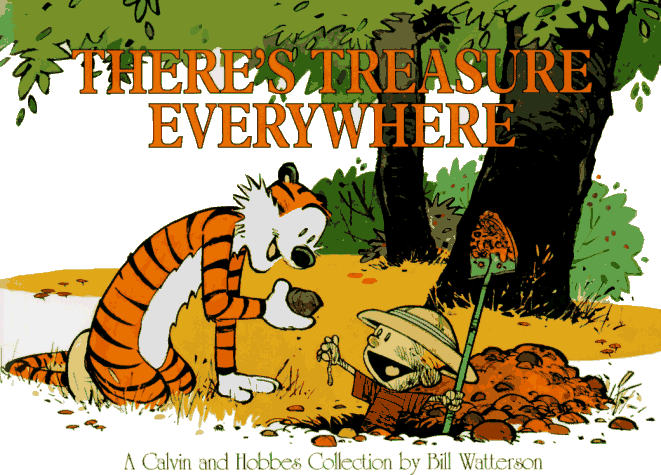
Me: We need to stop coloring inside the lines.
Dennis: THIS (gesturing expansively to the wall with both hands) is everything, my friend. All life, human and otherwise, is a kind of guerilla art on the walls of the universe. (full beat) Come on, this way.
We turn down a crooked alley that looks perfect for a stabbing, no one there, except a guy, six-six, two-ninety, in a camoflauge NorthFace puffer standing outside a small door.
As we get closer, muffled sounds of percussion. The guy just stares at us when we walk up in front of him. Dennis pulls out his passport and hands it to him. The guy flips through, peeking up at Dennis occasionally.
Camo-NorthFace: Cambodia? Lombok?
Dennis: (ruefully) I got there too late.
Camo-NorthFace: Hmmm. (hands back passport to Dennis and looks at me)
I give him my license and does the peek back and forth move.
Camo-NorthFace: Wide-Eyed?
Me: A guy from my soccer club in high school, we were catching up a few years ago, killed a bottle of Anniversario sipping rum between the two of us. Three quarters of the way into the bottle, he said to me, “you were always the wide-eyed one.” It seemed significant. I adopted the epithet. Looking back, I’m actually not even sure I heard him correctly, though.
Camo-NorthFace: Hmmmmmmm.
He opens the door for us and a hot snare beat smacks us in the face.
Then, what sounds like two trombones.
New Orleans brass, in the depths of Chinatown.
Dennis: Awwww yea.
I believe in music
It is hours before we emerge.
Me: (shake my head, deep inhale, sighing exhale) Ahhhhh, music!
.. I remember once, I was working a construction job during a college summer. We had to run some plumbing pipes, and I spent three full days digging a ditch with a mattock and spade, in this hard Georgia clay, under the hot sun.
.. I brought this little Sony boombox, though, and listened to music all day, and it was not so bad.
.. Now my primary tool is the keyboard, my hands are soft and smooth, no more callouses. I wonder what my grandfather would say if he shook my hand?
Dennis: (his eyes go distant, contemplating) La dolce vita… (he punctuates every syllable) … Now, we have GOT TO find a diner!
Sounds of a Diner
Dennis: Sit at the bar. That’s where the action always is. Higher probability of collisions.
We order some eggs and rye toast.
Dennis disappears to find the bathroom, and I turn to the guy sitting next to me.
Me: I love the sounds of a diner—the clinkle of silverware, plates stacking, percolating coffee, murmurs of conversation, shouts back and forth to the kitchen. It’s bustling with a motherly energy that makes you feel everything is gonna be all right, someone is taking care of you.
Guy: Mmmmmm, hmmmm. (nods agreement, sips coffee, savoring it, then resumes conversation with the guy wearing an apron behind the bar, returning from the kitchen). Well, Joe, you should have him apply with us. We have a really good program.
Joe: You have athletic scholarships?
Guy: Sure.
Someone dings a bell, and Joe heads back toward the kitchen.
Me: You a teacher?
Guy: I was for many years. Now I’m a dean.
Me: Nice. I think education is probably the most important thing, if democracy is going to be the way we govern. I mean, if the citizens are going to rule themselves, they better be educated. It is really the fundamental problem of the modern world, of democracy and capitalism.
.. One of the most profound things I have heard in years was Yvon Chouinard—he founded Patagonia, the clothing company—talking about this in the context of a rough patch they ran into years ago. He said,
The reason we got into trouble in the first place is that—with this synchilla—we were selling stuff to people who wanted but didn’t need it.
Me: It sounds like just another anecdote, but I think it’s like a zen koan you could unpack for years. It’s the crux of everything—business, government, entertainment! But the unfortunate thing is, within the capitalist system, if you try to do the right thing, and cater to the needs and not the wants, somebody else will step in and sell people what they want—bread and circuses, as Juvenal said. So, this is why education is so crucial, it could be the only way to get at the root cause of the problem, try to align the wants with the needs. I wrote my undergraduate thesis on some variations of this theme in Plato’s Statesman and Republic.
Guy: Oh, you studied philosophy? So did I. Do you work in philosophy or education now, or put it to use?
Me: Not professionally, but making decisions from first principles and rigorous analytical thinking—these I do everyday, so in a sense, yes. And, I still think a lot about education. It seems like an important part of the solution for lots of the big problems in our world, for example, the socioeconomic and genetic lottery. Education is probably the greatest equalizer, in that it seems like the best opportunity for someone born into an unlucky situation to improve the quality of their life.
Guy: That’s right. I actually spent a bunch of time working in urban schools in Chicago, and we had this pretty innovative work/study program, which made an excellent but expensive middle and high school program accessible to a bunch of kids who most needed it.
Me: Amazing. Was it effective?
Guy: Yes, very.
Me: That’s good to hear. I used to think the problem was much bleaker, but this sounds like a cause for hope, like that school in Harlem profiled in Waiting for Superman, where they enroll the kids all year and get amazing results, regardless of what the home situation is.
.. Given a few proof points of programs that do work, I suppose the next step is figuring out how to scale these programs out. But that seems really difficult. To scale, you really need metrics and a way to measure the efficacy of education, and it seems like most of our attempts to do that have led to gameable systems, where winning the game does not correlate to actual learning. And then there’s the whole issue of teachers’ unions and tenure. I really don’t have any faith in our government being able to solve the education problem, given their track record so far.
Guy: Are you a libertarian?
Me: You know, I used to think, when I was younger, that everything just came down to the individual, that you could overcome any parenting, or economic background, or, to the discussion at hand, any educational program, with hard work. I think the high school mind has an attraction to self-reliance, as you are just beginning to feel and flex your adult mind, so things like Emerson and Thoreau and Ayn Rand and libertarianism are highly attractive.
.. The older I get, the more I realize the significance of the systems we act within, and the more grateful I am for my parents and the amazing people I have met. There is a new aristocracy of access to good mentorship. I suppose I have less ego now.
.. It’s a slippery slope, though, that you might follow to a view that totally dismisses the agency of the individual.
Guy: But you are right to acknowledge the role of systems, of environment. No one is born into a vacuum.
Me: Yea, this is why I love surfing. It’s a good exercise in holding your individual agency, skill, and effort in one hand, and then a submission to everything outside of your control—the force of the ocean, whether or not there are waves, nature—in the other hand.
.. It’s a balancing act, and I think most ideologies have an unhealthy bias toward one extreme. Libertarians tend not to give enough credit to systems outside the control of the individual. But if we were all Buddhists, I don’t think our species would outlive the sun.
Guy: Ha. You religious? I’m a Jesuit, by the way.
Me: No wonder you are a prolific educator (a comrade smile). I was raised Catholic, but, ironically, my final involvement with the church was my confirmation.
Guy: Are you parents very religious?
Me: My Dad, I suppose, my Mom, not really. I think they wanted me to make the decision myself, expose me to it. That and I think a lot of people put their kids into the church for the sake of the grandparents. This is my theory about why a lot of marriages still happen in churches even though the newly weds are not practicing.
Guy: We see a lot of people re-engage with the church when they get married. I was just talking to this one couple—neither of them has been practicing for their adult lives, but their parents are Catholic—and marriage was an impetus for them to reexamine their spiritual lives. I will be performing the ceremony in a few weeks.
Me: Hahaha (shaking head in mild disbelief about… ) Some good friends of mine just asked me to perform their wedding ceremony. They will be getting married in about a year. I was shocked and honored when they asked. I feel like I need to go learn everything there is about marriage over the next year.
Guy: Are you some sort of priest?
Me: No, not really.
Guy: Why did they ask you, then?
Me: Hmm, I guess they sort of respect me as a mentor or something. They are a few years younger than I am. The funny thing is, I feel like I have learned more about relationships and love and connecting deeply with other human beings from them than the other way around, so maybe it is a gift? I feel a little under qualified for the job. But, one of my mantras is: every opportunity is an obligation. I’m going to put in the work and deliver.
Dennis: (returning from a conversation with another table) Did I hear you talking philosophy over here? Have I told you about the treatise I’m working on? It’s called A Critique of A Critique of Pure Reason. (nudges some egg onto his fork with a piece of toast, takes a bite, continues talking while chewing).
.. The premise is that you can’t simply think your way out of every problem, you need acknowledge the subconscious, or at least, if you don’t, you’re missing out on a lot of brain power. So, for example, when I’m writing, I never sit down to a blank page and say to myself, OK, go! And then just churn something out. That’s too forced, unnatural. Didn’t Hemingway say he always ended the day with half a sentence to make sure he could start again the next day?
.. Well, my flow is I’m always both acting in the world and observing the world. All the good stuff comes from experience. You can’t write if you don’t have experience. And as I’m experiencing the world, I’m constantly jotting down notes, things I need to flesh out in writing, and so when I sit down to actually write, I have a pile of ideas in front of me.
.. I think there’s a lot of truth in that idea the ancient Greeks had about the Muse speaking to you. Generally, when I feel creative or come up with a new idea, it doesn’t so much feel like it’s coming from within me, but rather from being in a situation or exposed to other ideas or stimuli in the world around me, in such a way that I recognize a new pattern, and express that pattern as a new idea. Juxtaposition is the mother of all invention! It’s how nature teaches us.
Me: But we don’t have infinite time. We can’t just sit around and wait for the Muse all our lives. How do you temper your theory with the sense of urgency that defines life?
Dennis: The urgency is in getting out there, where the Muse can find me. The patterns are in the world, not inside me, and it’s just up to me to put myself into the situations where I maximize my opportunity to recognize new patterns.
.. And then, when she does speak, you GOT to listen, and move quickly, because she is gone in a flash.
Guy: So did the Muse speak to either of you tonight?
Me: Hmmmm, I don’t think so, at least not about KSCORN…
Dennis: (another forkful of toast and egg into his mouth) The night isn’t over.
Me: Mm. So where do we go from here?
POP
Luckily for me and Dennis, at this point in the story, I broke a cardinal rule of writing (or was it the Heisenberg Uncertainty Principle?) and explained the half begun work to Daniel, out in Vinegar Hill.
Daniel: The danger with that sort of thing is that you walk the line of pretension. I mean, just being ridiculous for the sake of drawing attention, it’s uncouth.
Me: Agreed, but the point is not to call attention to the self, but to the absurdity of the exercise, which involves at the same time inflating the self and reducing its vast complexity.
Daniel: Hmmm, hmmm (mulling). Have you been to the Museum of Jurassic Technology? It seems related, thematically…
There is a autobiographical strange loop, where the author reaches the present moment in the narrative, and in order to continue, he would have to write about writing an autobiography, and then write about writing about writing an autobiography, and so on, ad infinitum. In this instance, the subject, stuck without a next move, caught up in time, perhaps deiliberately, so that the author could have the next experience that would inform how the narrative moved forward. I guess sometimes the author decides where the characters go next, sometimes the characters decide.
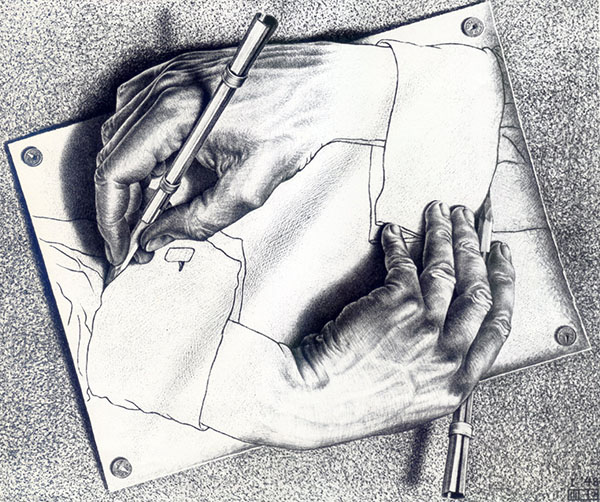
PUSH
We head straight from the diner to JFK and hop on the first flight to LA to search for clues at the Museum of Jurassic Technology.
Me: I think I could live in a post-Uber LA. The necessity of driving always turned me off in the past.
Dennis: Whenever I think “LA,” in my head, I hear it in the voice of David Carradine narrating On the Road:
I loved the way she said “LA”; I love the way everybody says “LA” on the Coast; it’s their one and only golden town when all is said and done.
Me: A friend of mine said all of the artists are leaving New York, coming out here. It’s half the cost of living. Actually, let’s pick her up on the way. She’ll be interested to see this place.
We meet Rebecca at her brother’s studio / gallery. She’s wearing an Element pomppom beanie and white Keds, about to close up for the lunch hour. Nine foot by sixteen foot black paintings lean huge against all the walls.
Rebecca: My brother suffers from a rare disorder, preemptive nostalgia. In all beauty, he sees something of the abyss, he cannot help but extrapolate every curve to its limit.
.. He is working on this series of portraits. (turning and gesturing with an arm) He starts with a digital photograph, close up, then manipulates each one with Photoshop, blacking out every pixel but one. Then, he paints the result on a huge oil canvas.

Rebecca: I’m trying to help him grapple with the disorder. The doctor thinks the cause has something to do with visual perception and foreshortening. He recommended exercises in perspective.
Dennis: I can empathize. Greatness often brings to mind its own scarcity. The vast majority of the area under the bell curve is mediocrity. Do the integral, it’s calculus! Sometimes, I think the best conversations I have had are with the dead. How can the average conversation compare with engaging Aristotle, Nietzche, Mann, Feynman—the greatest thinkers of the ages? (walks over and begins reading from a wall placard)
But from the moment he knows, his tragedy begins.
....
If this myth is tragic, that is because its hero is conscious ... [ but ] .... Sisyphus, proletarian of the gods, powerless and rebellious, knows the whole extent of his wretched condition: it is what he thinks of during his descent. The lucidity that was to constitute his torture at the same time crowns his victory. There is no fate that can not be surmounted by scorn.
Me: Your brother has great courage to stare his condition in the face like this.
.. Makes me think of this horrible dream I have been having. In most nightmares, the most terrifying part is right before you wake up. With this one, the hour just after waking up is the worst. The only thing I can see is the point of my own consciousness on the brink of the infinite abyss.
.. I always look away, look for relief in distraction.
.. Your brother reminds me of a scientist, who looks at the bleakest realities under a microscope, with no filter, and in spite of all this, still chooses to strive for progress. This is the noblest act there is.
Dennis: Progress is just the noblest form of distraction.
Me: Ha! You think you debase progress by calling it another form of distraction, but doing so almost makes it more noble.
Dennis: Debatable. And we’re not here to settle that one, nor do we have the time. Let’s get out of here and head to this Jurassic Tech Museum.
Into the Woods
Dennis: Come here. Look at this. (reading a placard)
Our planet’s rain forests - rich matrices of life which exist primarily in tropical regions - provide us with unique opportunity to observe life in all of its manifold and perplexing beauty. Most rain forests date back some two to three hundred million years. This extreme age has allowed many unusual and complex relationships to develop among the inhabitants of these tropical ecosystems.
In the rain forest of the Cameroon in West Central Africa lives a floor dwelling ant known as Megaloponera foetens, or more commonly, the stink ant. This large ant - one of the very few to produce a cry audible to the human ear - lives by foraging for food among the fallen leaves and undergrowth of the extraordinarily rich rain forest floor.
On occasion one of these ants, while looking for food is infected by inhaling a microscopic spore from a fungus of the genus Tomentella. After being inhaled, the spore seats in the ant’s tiny brain and begins to grow, causing changes in the ant’s patterns of behavior. The Ant appears troubled and confused; for the first time in its life the ant leaves the forest floor and begins to climb.
Driven on by the growth of the fungus, the ant embarks on a long and exhaustive climb. Completely spent and having reached a prescribed height, the ant impales the plant with its mandibles. Thus affixed, the ant waits to die. Ants that have met their ends in this fashion are quite common in some sections of the forest.
The fungus continues to consume first the nerve cells and finally all the soft tissue that remains of the ant. After approximately two weeks a spike appears from what had been the head of the ant. This spike is about an inch and a half in length and has a bright orange tip heavy with spores which rain down onto the rain forest floor for other unsuspecting ants to inhale.
Rebecca: Horrifying.
Me: (looking to Dennis) KSCORN?
A tiny Japanese woman, who was browsing at the other end of the room, looks up and tip toes over to us in white socks, wood sandals, a kimono. She has an elegant, motherly aura. She reminds me very much of the matriarch of an eight seat restaurant I randomly discovered and ate at in Kyoto many years ago.
Old Lady: That is an emotion not necessary here, young man.
Dennis shoots me a warning look, she might be with them, don’t show our hand.
Me: Oh, uhm, yes, I’m sorry.
Old Lady: Nor is sarcasm or outrage or any other form of marketing. It is no wonder the attention span and the memory* of the young generations have grown so short, for who wants to hold onto these feelings?
Dennis: (musing) So it is a sort of defense mechanism?
Old Lady: Good! Don’t throw that energy into the world, because it will bounce back. And there is no neutrality, no no… only light and darkness, you are giving energy or taking it. And it is a miracle—a miracle, I say!—in this universe, where there is so much darkness and more sneaking in all the time—the mere possibility of beaming out the light energy. Can you believe it!? (half beat) Don’t answer now, think on this deeply, and when you have done so, ask yourself, are you carrying the fire?
She pauses, to examine the placard we have been reading.
Old Lady: I don’t think this is going to aid you on your journey.
She turns, begins walking towards another chamber, and we follow.
Old Lady: Tell, me, are you familiar with Archaic Torso of Apollo? (not waiting for an answer)
We cannot know his legendary head
with eyes like ripening fruit. And yet his torso
is still suffused with brilliance from inside,
like a lamp, in which his gaze, now turned to low,gleams in all its power. Otherwise
the curved breast could not dazzle you so, nor could
a smile run through the placid hips and thighs
to that dark center where procreation flared.Otherwise this stone would seem defaced
beneath the translucent cascade of the shoulders
and would not glisten like a wild beast’s fur:would not, from all the borders of itself,
burst like a star: for here there is no place
that does not see you. You must change your life. *
Dennis: (in hushed reverence) Namaste.
The old lady gives the slightest of bows and turns to contemplate something else, clearly through with us. Dennis tugs me and Rebecca away.
Redeye, LAX => JFK
Back to LAX, after we drop Rebecca off at her brother’s. We still haven’t slept, but the old lady’s words are not exactly a bedtime story, and we’re both lost in thought on the redeye back home.
To take my mind off the events of the past few days, I try to do some reading, Daniel Dennett’s Consciousness Explained.
He presents a compelling theory for how consciousness might have evolved from communication. After developing symbols and language they might use to point out features of the world to one another, early humans might have accidentally uttered words or made gestures when not in the presence of one another, and then, in the same way they responded to these same prompts when made by others, they were “autostimulated” and were able to respond to themselves.
He goes on to refute the Cartesian Theatre theory of consciousness, arguing that there can be no single observer inside the mind, because biologically there is no place for one. He presents an alternative “multiple drafts” theory of mind:
The Multiple Drafts model avoids the tempting mistake of supposing that there must be a single narrative (the “final” or “published” draft) that is canonical—that is the actual stream of consciousness of the subject, whether or not the experimenter (or even the subject) can gain access to it.
I close the book*. It just seems like a continuation of our conversation with the old lady. Gazing into the hardware of my mind, I see each draft plotted over the months as a sin wave—at the maxima, a sense of energy and wonder for all that is beautiful, and, at the minima, a despair that maybe not enough people are carrying the fire.
Me: Do you think she knew about KSCORN?
Dennis: I’m not sure it matters—the intel was good either way, right?
We land at 5:58 am ET.
Exhausted, but not sleepy, I head to the YMCA for a swim while Dennis goes to find breakfast. I want to get into a state where I can sleep for the afternoon.
Most people would say get yourself a coffee and try to stay awake all day to get back on a normal sleep cycle, but these days I do everything I can to hold onto my jet lag. I love being active at the odd hours. It’s sort of like looking at everything from a different angle. And the afternoon hours are the worst, anyway, full of interruptions, very little creative energy. Perhaps the Spaniards are onto something with the siesta.
Or perhaps we can figure out how to do away altogether with sleep. I read recently that one of the primary functions of sleep is to restore reasoning and problem solving faculties by clearing the brain of a toxic protein inhibiting these faculties, beta-amyloid. If we reverse engineer the restorative processes of the glymphatic system and figure out how to simulate them, we might take back one third of our waking lives. This seems like a huge opportunity.
I fall asleep wondering who is working on this problem.
Intermission
I wake up to a text from Dennis: Let’s meet Rita at Buvette, debrief, unbiased 3rd party opinion
Details
Rita: These beets are amazing.
Me: To borrow a phrase from the best customer review we have ever received at Venmo, “These guys know what the fuck they are doing.”
.. You know, one of my favorite things in life, is when you see something like this place, and think, if I tried to do that there’s no way I’m coming even close to that Jordan level execution. It’s such a delight, because so few people have both the dedication and talent to pull it off. But you know when you see it.
.. All the food here is amazing. The space is so tiny, but it feels deliberate. And look at the amount of little things in here, on all the shelves and walls. Insanity, I’d say if you told me you wanted to cram all this stuff in here, but everything is so neat and in its place and necessary. And the staff, I mean, they just pickup on everything, even the nonverbal cues are dialed in. I LOVE Buvette.
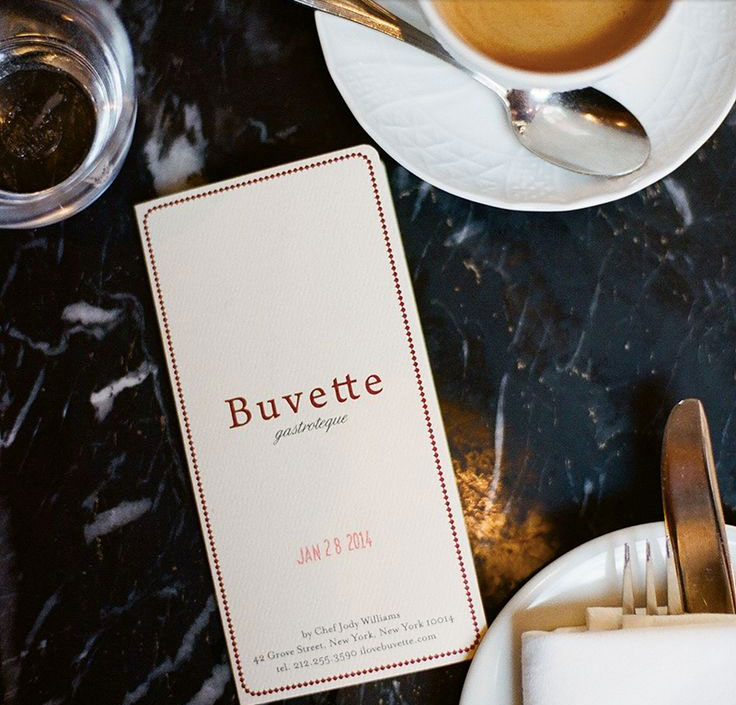
Rita: I was here once, having breakfast with some friends at the communal table. Two women sat down next to us, and one of them ordered an almond milk latte. The waitress said, “I’m sorry, we only have organic whole milk.” Ha! I thought, how beautifully French. It was really quite lovely to hear, to be in a place that has the courage to have an opinion.
Me: Yes! I think that’s exactly it, and it’s the answer to something that has been puzzling me about film for some time now. On the one hand, it’s so immersive a sensory experience, but on the other hand, you might also say that in order to create that sort of total immersion experience, you have to be kind of authoritarian in your relationship to the observer.
.. Authoritarian, I mean, compared with other media like video games or the internet. There are these formats where the observer—erg, that word itself is wrong—where the experiencer has more agency, or is simply just less locked in. Do kids even watch movies anymore? If not, perhaps it is a taste they will acquire with age?
.. Really, I think what’s attractive about film, as an experiencer, is just what we are saying about this place. It feels good to know that the designer of the experience has nailed all of the details, has an opinion, and to trust them to deliver on that.
Rita: I have so much respect in particular for a physical experience, like this one, because you have this variable of the people who work here. Getting those people right is the hardest part.
Me: Yes, but so many great things, even if the experience does not require staffing, require coordination of a group of people on the creation side, and demand a similar respect.
.. But I do agree, though, that coordinating a group of people towards a common end is incredibly hard. It’s an age old problem. It’s what Plato’s Republic is about.
.. Do you do all the hiring at the bakery?
Rita: Much of it.
Me: Any tricks? Things you look for?
Rita: I think a lot about the first job I had in a kitchen. Fourteen hour days. We were obsessed with quality, and learned so much. Then we’d end up in these places, magical, you know, like banquets and parties that were glimpses into whole other worlds. And it was hard, hard work, but so rewarding.
.. So, the thing about New York, the people that are here, they are here for SOMETHING. Otherwise it wouldn’t be worth the effort and the cost. You can do anything here, but I need to see that you know that and that you can make it happen. There’s two groups, the ones that figure this out, and the ones that leave. You can spot the difference pretty quickly after working with someone, but the trick is to spot it just by talking to them once.
Dennis: Well, I think it’s a safe bet that the folks at Buvette here know how to “make it happen.” (savoring a bite of bread)
Rita: Yes! (full beat) So, I’m still trying to wrap my head around this conspiracy theory of yours. Someone is slandering you, posting misinformation?
Dennis: Noise flood. It is already a known privacy tactic—the President, when he needs to have a private conversation, he goes into a sealed room or tent that constantly emits noise—anyone trying to spy on him, will just hear the noise. You can’t ever completely hide, so you just drown out your activity. Well, obfuscundation uses the same principle, except instead of using noise to obscure your own activity, you use noise to drown out someone else’s message.
Rita: And this is what the USDA is doing with the search results and Wikipedia page and news feeds and things?
Dennis: Precisely, along with KSCORN.
Rita: I don’t know, it all seems a little far fetched, a series of coincidences. It sounds like you are just assigning meaning where there is none.
Dennis: That, my dear, is the human condition! Biology is just a series of coincidences. And as long as we are the ones assigning the meaning, we may as well make it interesting.
Measured by the scale of eternity, all activity is vain - (if we allow thought to engage in an adventure the result of which would be infinitely grotesque and add significantly to our knowledge of human impotence). But supposing life to be a poor farce, without aim or initial parturition, and because we think it our duty to extricate ourselves as fresh and clean as washed chrysanthemums, we have proclaimed as the sole basis for agreement: art. It is not as important as we, mercenaries of the spirit, have been proclaiming for centuries. Art afflicts no one and those who manage to take an interest in it will harvest caresses and a fine opportunity to populate the country with their conversation. Art is a private affair, the artist produces it for himself, an intelligible work is the product of a journalist, and because at this moment it strikes my fancy to combine this monstrosity with oil paints: a paper tube simulating the metal that is automatically pressed and poured hatred cowardice villainy. *
He concludes with a flourish of the hand.
Rita: Well (turning to me), at least you have a Wikipedia page, and it doesn’t seem that bad.
Me: Not bad? They’re suppressing my message, my identity! It’s missing everything crucial.
.. When I look back, the vivid events, the moments of beauty—cherry blossoms blooming, the Rocky Mountains, no look passes, my first philosophy class, learning the importance of PB&J sandwiches cut into triangles, the side rib of a waitress at Mekong exposed with a perfect and tasteful elegance by a black cutoff top, the five hour conversations that flow with the greatest of ease when you go to dinner with the right person, the way some women can make you feel like the center of the universe when you look into their eyes, la concordancia, yuanfen, happening upon Nuyorican Son on a chance Van Pelt library-loaned CD, watching in open mouthed wonder Spirited Away for the first time, discovering an Every Frame a Painting Youtube essay at 2am, then watching all of the others before bleary-eyed dawn, ditto for the Before Sunrise films, Craigslist, the time Put It On came on the radio and Kunal said “Bob Marley is a saint,” singing Harry Belafonte songs on South St, biking the streets of Barcelona, watching Mintz demonstrate Cantor’s Diagonal Argument on a whiteboard for the first time—these are all missing.
.. When I realized the obfuscundation was happening, I started rattling off a counterattack, drafting an update to my bio full of outrage and sarcasm, decrying their tactics. But I’ve been thinking about this encounter with an old woman we met at the Museum, realizing that these emotions are just like nervous system reactions of pain, signals that there is a problem, an opportunity. If you’re a doctor, you don’t cure an illness by running around screaming in pain. You try to identify and understand root causes and how to fix those.
.. So, I dug up this python script I had begun writing to flag adverbs for deletion, and I modified it to do sentiment analysis and throw warnings when text contains sarcasm, outrage, or other net negative energy and emotion.
.. I ran my draft through that, cut it by eighty percent. Then I started looking deeper at the feelings of my reaction.
.. What is most mortifying about this KSCORN plot, I realized, is the suggestion that I authored an autobiography that mentions nothing of the deep gratitude and love I have for my parents, my sister, my mentors, my teachers*, my dearest friend and colleague Iqram, all my friends and all of my colleagues—for all the amazing people who have touched my life.
.. These moments and these people and these emotions are foundational, and these are all missing. These must be celebrated!
Rita: I’m sure those are beautiful memories—and if you are going to look back, with gratitude is the only way to do it—but why look backwards at all? I mean, naturally, biologically even (nods to Dennis), identity is bound to memory, but don’t you think that’s a pessimistic way to view and project the self? The etymology of nostalgia is in diagnosis of a mental disease, is it not?
Me: It’s not a yearning to go back to a particular point. The idea is to capture something of the beauty that caused an emotional response, and share the stimulus, so that, if on a winter’s night a traveler should happen upon this little corner of the internet, they might feel a reflection of the light of the original beauty.
Rita: And then what? The internet is already full of beautiful pictures. It sounds like what you really may be seeking is a “confrontation of souls”—do you remember this bit from Waking Life?
It’s kind of like D.H. Lawrence had this idea of two people meeting on a road… And instead of just passing and glancing away, they decided to accept what he calls “the confrontation between their souls.”
.. But you are limiting yourself within the bounds of your past experience. You’re not being generative, so there’s no call to action, no call to connection. I think you need a more optimistic view of the self, one in which what is primary is the potential, the future.
.. Define your identity by inventing new ideas. This is what will excite the free thinkers, the souls you’ll want to come into contact with.
.. I had this friend who described Instagram as a hyper-reality. The idea was that you have the editorial control to choose the best moments, apply the beautiful filters and frames, to present the idealized version of what was. It was a very astute observation, and it got me thinking, what if you treated the future as such a hyper-reality? Experience is just as malleable as fiction. Narrative is how our brains make sense of the world, and we are the authors of these narratives.
Me: Hmmmmm… (letting her words sink in for a second) I think you’re right, Rita. KSCORN tricked me into playing their game. The whole Wikipedia thing was a booby trap, devised to lead me backwards, distract me with editing the past, rather than the future. But what started this whole thing was trying to get out the soup manifesto…
Walking the Streets
This is one of those dinner sessions that started so late the staff lock us in while they clean up / close up, and we have to get them to unlock the door when we head out around five.
We hug and part ways. It’s that perfect hour for everyone to enjoy a postprandial stroll home.
At Thompson and Spring, there are some handball courts, surrounded by trees and park benches. A few of the park benches are setup facing each other, with a stone table between. A chessboard is etched on the surface of each table.
At one of these tables, a girl, ten or twelve years old, sits sketching. Her phone is propped in the folds of her backpack, light shining onto her notebook—a precarious, makeshift desk lamp.
Me: What are you doing out here by yourself at this hour?
Girl: Drawing, I couldn’t sleep.
Me: Can I see?
Girl: Mm (nods, tilting sketchbook at a better angle for me to view)
I lean in for a closer look.
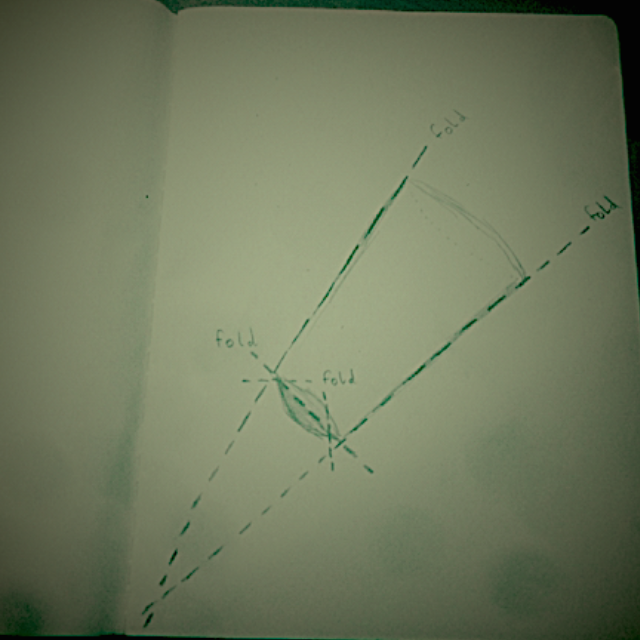
Me: What’s this?
Girl: It’s a cup that folds up, so you can carry it in your pocket. That way you don’t have to waste a paper cup every time you get a coffee.
Me: That’s a great idea. How did you come up with it?
Girl: At dinner the other night, my Mom told me about how they are banning plastic water bottles in San Francisco, because it makes too much trash. I have science fair this year, and I thought of trying to make this cup for that.
Me: And who’s that green person on the opposite page?
Girl: Plants are green because of photosynthesis. They use that to make food from the sun. I want to be a scientist and figure out how to turn skin green so people can make food from the sun too. That way, in the future, no one will have to starve.
.. I told my Mom about both and she said the cup will probably be easier to make for science fair, so I am working on that one for now.
Me: Wow! Brilliant. So, where is your Mom? She’s doesn’t just let you go out here by yourself, does she?
Girl: No, she is just over in that bodega getting something.
Never one to waste a chance to get more data about a hypothesis…
Me: Hey, can I ask you something? Do kids your age watch movies?
Girl: Yea. (laughs, silly!) I just watched Big Hero 6. It was awesome.

Me: What’s that about?
Girl: A bunch of kids that build robots and super hero suits to stop some bad guys. You should watch it.
Me: I will! Thanks for the tip.
Girl: Mm (nods, going back to sketching)
I walk down Spring to Wooster, to stop by one of my favorite pastings.
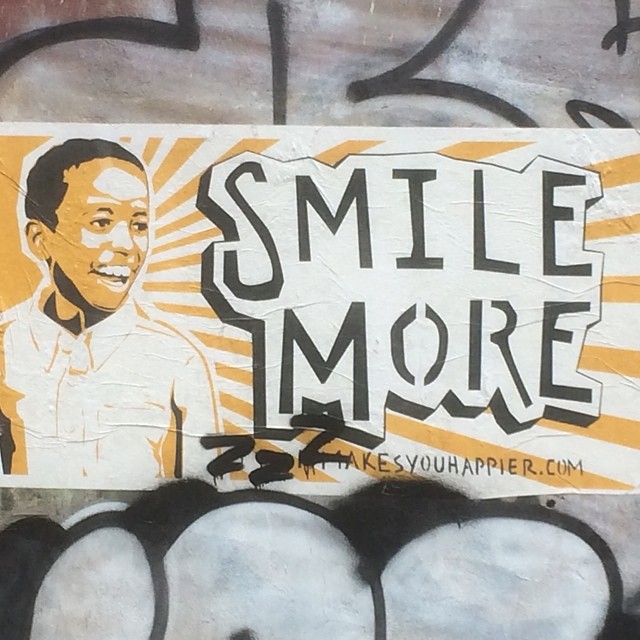
I text Rebecca: Is it selfish if the main reason I want to have kids is to learn from them?
Rebecca: (text) hey! was thinking about Jurassic lady, my bro, your dream. Made this, maybe it’ll help (then, a link to her Facebook profile)
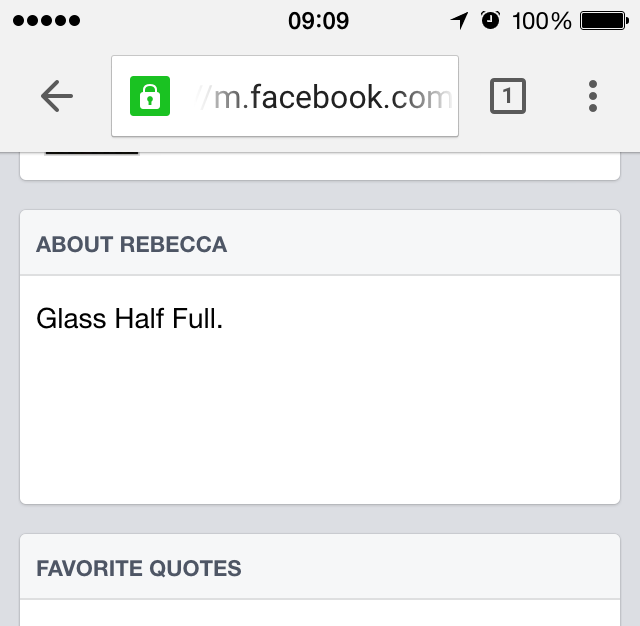
but in the long run...
Me: (text reply) why not, right? Bellissima
I stand, gazing at the wall for some minutes more, and realize it’s almost sunrise. I put in my headphones and continue my walk down Wooster St.
FIN.